新编英语教程Unit Four
Unit4英语短篇小说教程ppt课件
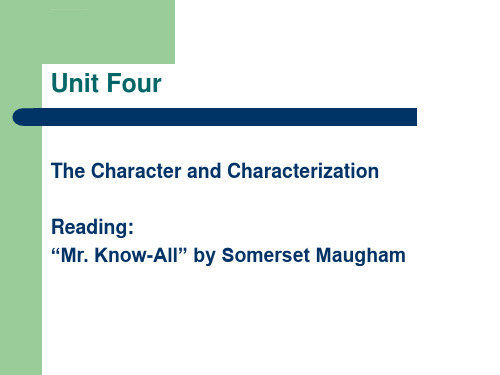
在整堂课的教学中,刘教师总是让学 生带着 问题来 学习, 而问题 的设置 具有一 定的梯 度,由 浅入深 ,所提 出的问 题也很 明确
The Character:
A round character: usually has more than one quality, and grows in the course of the story development, as he reacts to events and to other characters.
such as “he’s utterly selfish” or “he loves only himself.” The indirect presentation, on the other hand, does not mention
the trait but display and exemplifies it in various ways, leaving the reader the task of inferring the quality they imply.
A dynamic character, on the other hand, is one who is modified by actions and experiences, and one objective of the work in which the character appears is to reveal the consequences of these actions.
在整堂课的教学中,刘教师总是让学 生带着 问题来 学习, 而问题 的设置 具有一 定的梯 度,由 浅入深 ,所提 出的问 题也很 明确
Unit Four
新编大学英语视听说教程4听力原文及答案
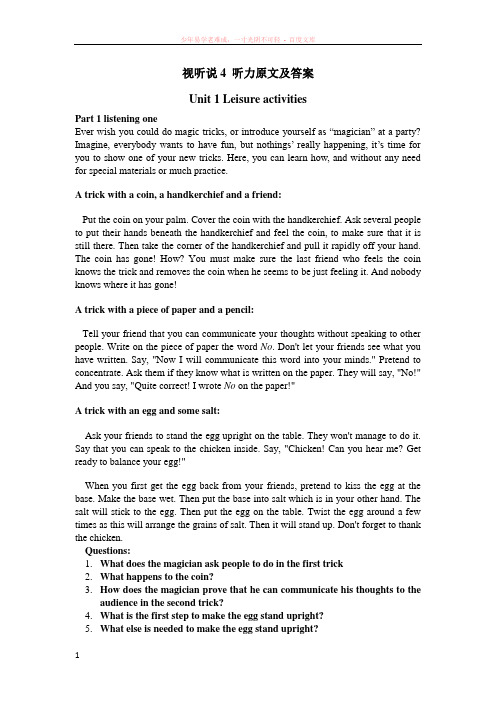
视听说4 听力原文及答案Unit 1 Leisure activitiesPart 1 listening oneEver wish you could do magic tricks, or introduce yourself as “magician” at a party? Imagine, everybody wants to have fun, but nothings’ really happening, it’s time for you to show one of your new tricks. Here, you can learn how, and without any need for special materials or much practice.times as this will arrange the grains of salt. Then it will stand up. Don't forget to thank the chicken.Questions:1.What does the magician ask people to do in the first trick2.What happens to the coin?3.How does the magician prove that he can communicate his thoughts to theaudience in the second trick?4.What is the first step to make the egg stand upright?5.What else is needed to make the egg stand upright?Keys: 1. B 2. C 3. C 4. A 5. DPart 1 listening two(The following is an interview from a weekly sports program.)Presenter: Good morning, listeners. Welcome to our weekly sports program aimed at all those underactive youngsters with time on their hands! Listen to whatour two guests have to say about their hobbies and how their hobbies havemade a difference to their lives. Adrienne first, then, Jonathan. Adrienne: I collect very interesting jewelry. I tend to travel a lot as most of my familyI and skills is a very compelling reason to choose a particular career. Presenter: Then, Adrienne, do you have a similar plan?Adrienne: Yes, I love making beaded jewelry. I’ve decided to get some formal training. I want to learn how to be a jewelry designer.Questions:1. Who is the target audience in the program?2. What is Adrienne’s hobby?3. What does Adrienne usually buy when she visits a place?4. How does Jonathan benefit from canoeing?5. What should be the major concern in choosing a career according to Jonathan? Keys: 1. A 2. B 3. D 4. C 5. BPart 1 listening threeGerry: I've just been to see Gone with the Wind. It was fantastic. Well worth seeing.Have you ever seen it?Judy : N o, but I've read the book. I don't think I would like to see the film really. It would spoil the story for me.Gerry: Really? Oh, give me a film any day. Honestly, if I had to choose between the film of a story and the book of it, I'd go for the film.I easiertake less time: two hoursan social event: fun, go with friendsBooks: take more time: one weeknot a social event: do it on your ownbooks: use readers’ own imaginationget much more insight into the charactersfilms: spoil the storyexpensivePart 1 listening fourSally Marino gets married. After the wedding, there is a big party—a wedding reception. All the guests eat dinner. There is a band and, after dinner, everyone dances. Sally's mother and father pay for everything. At the end of the reception, Sally and her new husband cut the wedding cake and all the guests get a piece.Pete and Rose buy a new house. After moving in, they invite their friends and family to a party—a housewarming party. Everybody comes to see the new house. They look at the bedrooms, the dining room, even the garage. Pete and Rose serve drinks, sandwiches, and snacks. The party is on a Saturday afternoon.Receptionist: The first one is an aerobics class from 8:30 to 9:30 in the morning. Then there's another aerobics class at lunchtime from 12:30 to 1:30.Cathy: Right.Receptionist: Then in the evening from 5:30 to 6:30—another aerobics class too. And there's a jazz dance class from 6:30 to 7:30.Cathy: Right. And what level are they for? I mean, would they be OK for a beginner?Receptionist: The morning aerobics—8:30 to 9:30—is advanced. All the others are at the beginner to intermediate level. But let me give you a schedule.Cathy: Thanks. And how much does it cost for a class?Receptionist: You pay a £1 entrance fee and then the classes are £2.50 each and £3.50 for the jazz dancing. It's there on the sheet.Cathy: Oh, yes, I see.Receptionist: If you become a member, entrance is free and...Cathy: Oh, no, it's OK. I'm only in London for two weeks.Receptionist: Oh, right. That's no good then.Cathy: And I guess you have showers and everything?Receptionist: Yes, sure, and in the evenings you can use the sauna free, too.Cathy: Oh, great. So the next class is at 5:30? Well, I'll see you then.with foreign currency, changing money and all that when we go abroad. Ihate all that. And it's so confusing.Woman: O h, don't be silly, Steve.Man: And what's more, I can't speak any of the languages—you know that. It's all right for you. You can speak some foreign languages.Woman: Exactly. You see, what I'd really like to do is practice my French and Spanish. It would help me a lot at work.Man: Mm, but that's no use to me.Woman: B ut just think of the new places we'd see, the people we'd meet!Man: But look, if we stayed here, we wouldn't have to plan very much. Woman: I'm sorry, Steve. No. I don't fancy another cold English summer. Questions:1. Where does the man want to spend the summer holiday?2. According to Steve, what is considered important in planning vacation?3. What does Steve find confusing about traveling abroad?4. What will help Juliet in her work?5. What does Juliet think of summer in Britain?Keys:4. Why was it NOT possible to have football matches between two schools until 1850?5. What happened to football in 1863?Keys:1. D2. D3. A4. C5. CListening 4In one town, there were three longtime friends, Pat, Mike and Bob. Pat and Bobwere quite bright, but Mike was rather dull.One day as Pat and Mike were walking down the sidewalk together, Pat put his hand on a solid brick wall and said, "Mike, hit my hand as hard as you can." Mike struck a hard blow, but Pat pulled his hand away from the wall just before Mike's fist hit it. Of course, it hurt Mike's hand very much when he hit the wall, but Pat said, "That was a good joke on you, wasn't it?" Mike agreed, but was not too happy.The following day Mike and Bob were walking in the town square. Mike decided to play the joke on Bob. He looked around, and seeing no solid object, he placed his hand over his face and said, "Bob, hit my hand as hard as you can." Bob agreed, and as he struck a hard blow with his fist, Mike quickly pulled his hand away and wasanalysis of it. The second guy is so amazed that he says to the mermaid, "Hey, triple my IQ." The mermaid says, "Done." The guy begins pouring out all the mathematical solutions to problems that have puzzled scientists in all fields.The last guy is so impressed by the changes in his friends that he says to the mermaid, "Quintuple my IQ." The mermaid looks at him and says, "You know, I normally don't try to change people's minds when they make a wish, but I really wish you'd reconsider."The guy says, "No, I want you to increase my IQ five times, and if you don't do it, I won't set you free." "Please," says the mermaid, "you don't know what you're asking... It'll change your entire view of the universe. Won't you ask for something else? A million dollars or anything?"But no matter what the mermaid says, the guy insists on having his IQ increased by five times its usual power. So the mermaid sighs and says, "Done." And he becomes a woman.Keys: 1. F 2. F 3. F 4. T 5. Tevident.Bob White: I thought e-mail messages were gender neutral!Dr. Herring: No. While theoretical gender equality exists for the Internet, in reality women are not given equal opportunity because of differentcommunication and language styles between the sexes.Bob White: How does that happen? Do you have any hard facts to back up this impression?Dr. Herring: Yes. I've done a research project using randomly selected e-mailmessages from online discussion groups. I found that females uselanguage that is more collaborative and supportive such as "Thanksfor all your tips on...", "Good point." and "Hope this helps!". Mentend to use more aggressive or competitive language such as "Do youunderstand that?", "You should realize that...", "It is absurd tothink...".Bob White: How great are these gender differences?Dr. Herring: Males write messages using aggressive, competitive language more than twice as often as females did, while females use collaborativematter who opens the door for whom. Maybe females just should not expect too much. Life isn't a fairy tale after all.John: It's absolutely true. Sometimes I feel that there isn't any difference in the roles both genders can perform. Of course I'm not saying that men can give birth.Rather what I meant was except for the physical and natural differences between both sexes, there isn't much difference between them.Cathy: But honestly, although I don't expect guys to open doors for me, or to pull outa chair for me, I am usually quite impressed if they do so, as many guys don'tdo it nowadays. If the guy was walking in front of me and went through thedoor first, I'd appreciate it if he could hold the door and not let it slam in myface.John: Well, if I'm the one walking in front, I will open the door and hold it for the people behind me, be it a girl or a boy. I actually had the door slam right in my face a number of times though, when the person walking closely in front of me didn't hold the heavy glass door and let it swing back in my face. Of course, I tried to hold the door, but it was too heavy and too late. But I think it was more embarrassing for him than me as everyone was looking at him, while I was rubbing my squashed nose.Cathy: So being a gentleman does not stop at opening doors. There are many otherKeys:2. F F T T F2.1reflects descriptions 2.2 parents’ attitudes2.3suggest, act 2.4 raising their family, supporting their husbands2.5used to be, share these responsibilitiesPart 4 Listening 1"Equal" does not always mean "the same". Men and women are created equally but boys and girls are not born the same.You throw a little girl a ball, and it will hit her in the nose. You throw a little boy a ball, and he will try to catch it. Then it will hit him in the nose.A baby girl will pick up a stick and look in wonder at what nature has made. A baby boy will pick up a stick and turn it into a gun.When girls play with Barbie dolls, they like to dress them up and play house with them. When boys play with Barbie dolls, they like to tear their hair off.Boys couldn't care less if their hair is untidy. But for girls, if their hair got cut a quarter-inch too short, they would rather lock themselves in their room for two weeks than be seen in public.Baby girls find mommy's makeup and almost instinctively start painting their faces.One day I took my seven-year-old son with me to shop for an electric wall clock for the kitchen and found a whole counter full of them on sale at a discount store. I had trouble deciding which clock to buy. While I held one clock in my hand and looked at another, I asked my son which one he liked better.“The one you’re holding with the mouse in it, Mom,” he said.Before I understood his words, a real, live mouse jumped out onto the counter and ran away. I screamed so loud everyone turned to see what was wrong. I was so embarrassed. I tried to make my way quietly out of the store. Everyone was looking at me. On the way out the door, my delighted son recited Hickory Dickory Dock. What anaughty boy!Questions:1.Where did the story take place?2.Why did the mother ask her son which clock he liked better?3.Which clock did the boy like best?4.Why did the mother feel embossed?5.Why did he boy recite Hickory Dickory Dock?Keys:2. B 2. D3. A4. C5. DListening 4It is my belief that gender stereotypes are very real gender characteristics that are exaggerated to the extreme ends with no gray areas. So in truth a woman is "weak" physically only because a man is in reality "stronger". A woman is "submissive" only because a man in reality is more "aggressive". A woman is "emotional" only because a man is "less emotional". All these are observed facts.Are there ways to avoid the stereotyping? This is hard to do. We as males and females love to exaggerate our differences. It seems we love to do this in many ways.We love to exaggerate gender traits as if to say "Look how female I am" or "Look how male I am". Do we go so far as to actually create differences that do not exist? Not from what I see. I think we like to exaggerate our differences because the more male we feel or the more female we feel the more attractive we feel.So all in all I believe stereotypes are true differences that are exaggerated. I don't think stereotypes should be avoided because they are real. I do think that we should not place extremes of a trait to a gender as a whole and most certainly not limit someone's potential abilities based on a stereotype. Stereotypes should apply in general but not to an individual. They should serve to help make judgment but not as an absolute.proficient 6)interesting 7) original 8) less 9) finish the race Listening IIOnce Wealth and Poverty approached a merchant and introduced themselves as Goddesses. The merchant greeted both of them and said, "May I ask why you have come to my humble home?" The Goddess of Wealth said, "We want you to judge between us who is the most beautiful."The merchant did not know what to say. He knew he was between the devil and the deep blue sea. If he said that Wealth was more beautiful than Poverty, Poverty would curse him. If he said that Poverty was more beautiful than Wealth, Wealth would abandon him. However, he became calm and said, "I have great respect for you both. Would you please do what I ask of you? It is the only way I can judge properly." The Goddesses agreed. He said, "Mother Wealth, would you please walk towards my house? Mother Poverty, Would you please walk away from my house? This way I can see you both better, from near and far." The two Goddesses did what the merchant had asked them to do. Then the merchant confidently declared, "Mother Wealth! You appear most beautiful when you are nearest my house. Mother Poverty! You looktiles on the roofs, many of these houses now have living roofs. The wooden top of the house is covered with a special waterproof plastic material. On top of this there is soil, in which grass and flowers are planted. Such a roof can be very beautiful. But this really is not a new idea. When the early settlers came to the United States, they often made their houses by digging into the ground. Their roofs were made of wood, and covered by large areas of soil with grass or turf. They were warm, though not always waterproof. People replaced these houses and roofs as soon as they could live in regular wooden homes with wooden or metal roofs. Now, 200 years later, some people think of this as a new idea. But I think, "There is nothing new under the sun."1. 1) partly underground 2) living 3 ) digging into the ground 4) grass waterproofQuestions:1. What does the speaker mean by saying "There is nothing new under the sun"?2. What makes the speaker think of "earth-sheltered houses"?3. What is a living roof?4. How many years ago did the early settlers first build earth-sheltered homes?5. Why did People replace these earth-sheltered houses with regular wooden ones?transmit television.Man: Garbage! It was the Italians.Woman: No, it says here, the first TV transmission was in London, 1925. And here we are again, the first traffic lights were in London, in 1868.Man: But they didn't even have cars then, so why would they have needed traffic lights?1.D A A F C E A B B2.1)1762 2)1888/Belgium 3)1890/the United States 4)New York5)1514/Holland 1557 6) 1903 7) 1868Part 4 Listening 1Juan comes up to the Mexican border on his bicycle. He's got two large bags over his shoulders. The guard stops him and says, "What's in the bags?""Sand," answered Juan.The guard says, "We'll just see about that. Get off the bike." The guard takes the two bags and rips them apart; he empties them out and finds nothing in them but sand. He detains Juan overnight and has the sand analyzed, only to discover that there is nothing but pure sand in the bags.The guard releases Juan, puts the sand into new bags, hefts them onto the man'sLater, people learned to mix different clays together to make stronger pottery and to put the pottery in a fire oven so that the clay would harden faster. The potter's wheel was invented in China around 3,100 BC. The wheel spins clay like a top. It allows people to make pottery much more quickly and make shapes that were perfectly symmetrical—bowls that were really round, rather than lumpy or uneven. Pottery is not only considered one of the first inventions but also one of the first art forms. Most types of pottery have been painted with figures or designs; some even tell a story!1. B A C2. 1.The oldest known piece of pottery was found in china and dates back to 7900BC(and was made almost 10,000 years ago).2. It was used for holding water ,milk ,seeds, and grains.3. To make stronger pottery and to make the clay harden faster.4. It allowed people to make pottery much more quickly and to make symmetricalshapes.5. Because most types of pottery have been painted with figures or designs; someeven tell a story.Listening IIICathy: Yes, although she didn't like it.So, how did she cope?Michael:Cathy: She got an idea of putting art and candy together.Michael: How?Cathy: First she experimented with making an edible paint. She found that powdered food coloring mixed with vodka would work.Michael: That's quite a combination.Cathy: Then, for her "canvas", she melted white chocolate and molded it flat.She even learned how to make chocolate frames.Michael: What kind of art did she create?Cathy: She copied the works of famous painters. She displayed her candy art in the candy shop and customers would come in just to look at the art.Michael: What did her family think then?Cathy: They didn't take her seriously until the Toledo Museum of Art heard about her works and paid her to paint 77 reproductions of works intheir collection. That was her first big job. Now she works full-timeidea of making his own puppet show. He made a stage from wooden orange boxes and his mother's old curtains. He charged 2 cents for admission and earned 32 cents for his first performance.Spinney's family liked his creativity and encouraged him to do more . For Christmas when he was nine, his older brother made him a better puppet theater and his mother secretly sewed eight colorful puppets for him. Spinney later wrote, "The more I gave shows, the more I felt the power that one has when performing. All these people would sit in a room and listen to everything I said. I did all the character voices: little girl voices, an old lady voice, and a ghost voice. The audience listened and clapped atthe end, and also paid me to do it. What could be a better way to make a living than to perform? I knew that I would wind up in the world of entertainment."Spinney continued giving puppet shows. When he decided to go to art school, puppet shows helped him pay for his tuition. Even when he was in the army, he managed to continue giving puppet shows. He knew he wanted to do this as his life's work and that he wanted his audience to be children. When he was given the opportunity to create the character of Big Bird on "Sesame Street", he accepted it and over the years has made Big Bird one of the most beloved characters on American television.although it's really cold, you can still get a tan. Of course, the scenery is beautiful and it's really nice when you're tired to go and have a hot drink afterwards. The problem is that it's very expensive and really dangerous. But apart from getting hurt occasionally,I still thoroughly enjoy it.1. 1) tennis 2 ) quite young 3)soccer 4) a little kid 5) nearly 40 years 6)skiing 7) remember2. tennis 1,5,7 football/soccer 2,9,10 skiing 3,4,6,8Listening IIDuring the 1930s and 1940s, when someone asked a kid whom his role models were, he would often respond with the names of baseball players. Advertisers trying to sell a product would often turn to baseball stars because the public knew them and loved them. Now looking at today's baseball players, the only time we seem to hear about them is when they are complaining about their salaries. Baseball is no longer the great national pastime, and kids are looking elsewhere for their role models.Back in the 1930s and 1940s, money wasn't such an important issue. Players playedThere was no atmosphere. So we brought in a pool table and fruit machines. When players choose to spend time together, it generates a better atmosphere.The team spirit is very important, but I don't believe in motivating the team as a team.I don’t give team talks. I try to motivate the team as individuals. I speak to the players individually and try not to put too much pressure on anyone. I believe players perform best when they are relaxed. If they're too tense, I can guarantee they won't play well.I also believe in giving people autonomy. I like all the people who work for me to be autonomous. I very rarely interfere. I feel people should be judged on their results. Ifthey prove incompetent, then I'm incompetent if I continue employing them.It's like that with the team. I get criticized for not interfering during a game and for not making more substitutions. But I feel if I've chosen those 11 players to get a result, then I should leave them alone to get on with it.If I'm dropping a player from the team, I don't feel I have to explain it to them. If they want to discuss it, I'll say, "Come back and talk about it in a couple of days' time." But I don't try to remotivate them. It's up to them to have the character to fight their way back to the team. I'm a great believer that almost everything you achieve in life isas an occasion for propaganda. But why should the feelings of a few spoil it for all those who continue to be inspired by the Games?No! As long as the majority wants it, these Games will continue. This is sport, not politics, and it should remain so.1. 1.What is said about the purpose of the Olympic Games? C2.What is said about the spirit of the Olympic Games ? B3.What is said about the influence of the Games ? B2. 1.Criticism. 2. It could be harmfully deployed, as in war.3. The world is like a big family.4. Hostilities.5. The majority of people.6. To explain why the Olympic Games should be continued.hours. I suppose I finish at about midday.Karen: So you're free after twelve. What do you do then?Bo: You mean, what do I do in my spare time?Karen: Right.Bo: Well, we usually go swimming in the afternoon. That's all. I go to bed early. I want to win a gold medal for Sweden.Karen: Well, I hope you do. Thank you, Bo Lundquist. Next we have Bob Smith with me in the studio. Bob's a long distance runner and theAmerican 3000 meters champion.Bob: Hi!Karen: Hello, Bob. How is your training going?Bob: Fine, just fine. I have a really good program and I think I'm infirst-class condition.Karen: Tell me about it, Bob.Bob: Well, I don't like training early in the morning. I don't know why. I just don't like it. So I start around 10 o’clock.Karen: Mmm. And what about having lunch?People in tropical countries can read about winter sports but are unable to participate in them. They cannot build snowmen, throw snowballs, toboggan, or ice-skate. Above all, they cannot go skiing.Someone defined skiing as gliding over the ground on two boards. The sport is popular in America in the states which have snow in the winter months. The pleasure we take in this healthy outdoor activity is shared by the Finns, the Russians, the Swedes, the Norwegians, the Germans, the Italians, the Swiss, and the French, who also live in temperate zones with winter climates. But what must people from Egypt, Libya, and Nigeria think of this strange sport?Skiing, unlike tennis and baseball, is not a city sport. Until recently, even in countries with snow, it was limited to mountainous regions. Now there is a new variation that can be enjoyed by everyone. It's called ski touring.1. 1.building snowman2.throwing snowballs3.tobogganing4.ice-skating5.skiing2.Finland; Sweden; Switzerland; Germany; U.S.A; Italy; France; Norway; Russia (√)skill. Is it something that you just work hard to get, or is there a naturalsort of ability?Man: Well, there're people that have the natural ability, you know. I feel like I didn't have much. I just worked hard and that's what got me here.1. Male Baseball player 24 Pitcher five to six2. 1.What is the prime career time for a pitcher? C2. What makes the man successful in baseball, according to the conversation? A3. What can be inferred from the conversation? D4. Which of the following statements is true? D5. What kind of feeling does the man have now and then ? D6. What does the man think of baseball as a career? AListening IVLearning to swim had been surprisingly easy, thanks to the Navy's policy of dealing with fear by ignoring it. My fear of deep water left after my Navy experience. On the first day in the pool, an instructor with a voice like a bullhorn ordered 50 of us to climb a high board and jump in feet first. The board looked about 200 feet high, though it may have been only 20 or 25. A line was formed to mount the ladder andA2. How high was the board/? C3. What did the instructor do when he found out about the speaker’s problem?A4. Why did the speaker eventually jump into the pool? A5. What is the best way to overcome fear, according to the speaker? B6. Which of the following is true about the speakers’ education? D7. Which of the following can be used to describe the instructor? C8. Why did the speaker want to go to the shallow end of the pool? B9. Why did the instructor ask the speaker to do it again? D10. How did the instructor assure the speaker that he wouldn’t drown? B 2. 1) drifted 2) stepped 3) introduced 4) Quaking 5) climbed6) walked into 7)sinking 8) rising 9) broke 10)supportingUnit 6 risksListening 2Scripts:The possibility that something bad will happen is a risk. Risk can also be defined as the degree of danger that goes along with an opportunity. All risks have possible negative results. However, some risks are worth taking. For example, suppose that you have the chance to join a school football team. You risk a possible injury while playing to achieve the sense of accomplishment that comes with being on the team.。
第一册Unit 4新编实用英语教程第4版高教社教案
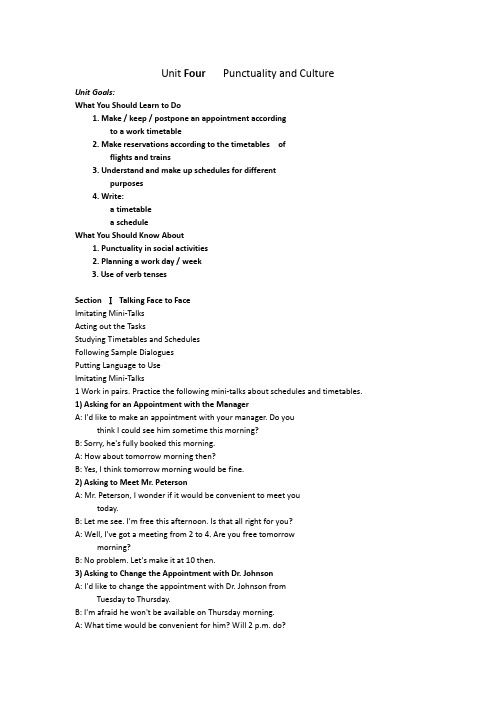
Unit Four Punctuality and CultureUnit Goals:What You Should Learn to Do1. Make / keep / postpone an appointment accordingto a work timetable2. Make reservations according to the timetables offlights and trains3. Understand and make up schedules for differentpurposes4. Write:a timetablea scheduleWhat You Should Know About1. Punctuality in social activities2. Planning a work day / week3. Use of verb tensesSection ⅠTalking Face to FaceImitating Mini-TalksActing out the TasksStudying Timetables and SchedulesFollowing Sample DialoguesPutting Language to UseImitating Mini-Talks1 Work in pairs. Practice the following mini-talks about schedules and timetables.1) Asking for an Appointment with the ManagerA: I'd like to make an appointment with your manager. Do youthink I could see him sometime this morning?B: Sorry, he's fully booked this morning.A: How about tomorrow morning then?B: Yes, I think tomorrow morning would be fine.2) Asking to Meet Mr. PetersonA: Mr. Peterson, I wonder if it would be convenient to meet youtoday.B: Let me see. I'm free this afternoon. Is that all right for you?A: Well, I've got a meeting from 2 to 4. Are you free tomorrowmorning?B: No problem. Let's make it at 10 then.3) Asking to Change the Appointment with Dr. JohnsonA: I'd like to change the appointment with Dr. Johnson fromTuesday to Thursday.B: I'm afraid he won't be available on Thursday morning.A: What time would be convenient for him? Will 2 p.m. do?B: Yes, that'll be fine.4) Asking About the Working Hours of a Ticket OfficeA: What are the office hours?B: Well, the office hours are from 9 a.m. to 6 p.m.A: Do you work on weekends?B: On Saturday the office is open from 9 a.m. to 3 p.m., but on Sunday we are closed.5) Asking About the Flights for MacaoA: Do you have flights to Macao?B: We have only one flight to Macao each week, at 1:40 p.m.Wednesday.A: When does it arrive in Macao?B: At 3:40 p.m.2 Work in pairs and act out the tasks by following the above mini-talks.1 Task:Look at the flight timetable in Exercise 3.Ask about the departure and arrival time2 Task:Look at the flight timetable in Exercise 3.Ask about the Tuesday flight for Hong Kong3 Task:Look at Mark's schedule in Exercise 3.Call to ask Mark for a change of an appointment.4 Task:Look at Mark's schedule in Exercise 3.Ask to make an appointment to see Mark on Wednesday.5 Task:Look at Mark's schedule in Exercise 3.An old friend in Hong Kong asks to see Mark on Thursday.Studying Timetables and SchedulesRead the following sample dialogues and try to perform your own tasks.Putting Language to UseSpeak and CompleteMark: Miss Wang, I want to 1 __________ an evening train to Harbin so thatI can get there the next morning. Do you know the schedule?Miss Wang: Yes. I have got a 2 __________________ here.Mark: Is there a train leaving around 6?Miss Wang: 3 ______________ one at 6:15.Mark: When will it get there?Miss Wang: 4 ______________ at about 8 next morning.Mark: That's the one I need. Thank you very much.Miss Wang: You are 5 ______________.SECTION II Being All EarsLearning Sentences for Workplace CommunicationHandling a DialogueUnderstanding a Short Speech / TalkLearning Sentences for Workplace Communication1 Listen to 10 sentences for workplace communication cross-referenced withtheir Chinese translations.arrange 安排confirm 确认due 规定(到达) 的delay 耽搁2 Listen to the following sentences for workplace communication in Column A andmatch each one with its Chinese version in Column BKey:1-i, 2-j, 3-d, 4-c, 5-f, 6-e, 7-h, 8-g, 9-a, 10-b3 Listen to 6 sentences for workplace communication and choose their right responses4 Listen to a dialogue and decode the message by filling in Susan's scheduleaccording to what you have heard.5 Now listen to a short speech / talk and fill up the blanks according to what youhave heard. The words in brackets will give you some hints.6 Listen to the speech / talk again and complete the information in Column A withthe right choices in Column B.SECTION III Trying Your HandPracticing Applied WritingWriting Sentences and Reviewing Grammar1 Fill in the office hours making use of the information in the passage that follows.2 Translate the following schedule into English, using the data bank in theWorkbook for reference.Writing Sentences and Reviewing Grammar3 Complete the following sentences, using the right verb forms4 Correct the errors in the following sentences.5 Translate the following sentences into English6 Suppose this is your schedule for the coming three days. Write a paragraph ofabout 100 words based on the information given in the schedule. You maystart the passage with the sentence: I've got a very busy schedule.KEYS: I've got a very busy schedule. I'm catching the 9:45 flight on October 8 and arriving in Shanghai at 2:00 in the afternoon. Bob is meeting me at the airport. I will check into Beach Hotel and have a rest there in the evening. On October 9, I'm meeting Mrs. Black at 10:15 a.m. and after having lunch at Beach Hotel we're visiting the plant at 2:30 p.m. The next day I'm attending a conference at 9 a.m. I'm leaving Shanghai in the afternoon. I'm taking a flight at 3:30 p.m. and arriving back at 7:45 p.m. Phillip will be there to pick me up at the airport.SECTION IV Maintaining a Sharp EyeInformation Related to the Reading PassageAmericans and Europeans consider time to be an asset that can be spent and saved; therefore, proper scheduling of time and its appropriate allocation to various competing tasks is an important part of organizational management. Variations in time use are expected to influence performance and stress, as well as other outcomes. It is a vital strategic element. Thelarge amount of management processes and methods developed to improve performance by managing time use proves the importance placed on time. Here are a few famous quotes and sayings about time and punctuality:1 Explanation of Difficult Sentences1. (Para. 1) One of the cultural differences that tend to annoy Americans has to dowith understanding of punctuality.Analysis: Has to do with is a phrase meaning has a specified relationship with.It is the predicate of the sentence. That introduces a restrictive relativeclause modifying differences.Translation:有一种常会惹恼美国人的文化差异可能关系到对守时的不同理解。
新编实用英语综合教程2(第二版)练习答案 (unit4-unit6)
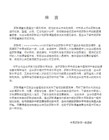
Payment: in cash
Tel. Number: 0086-431-568-9672
Fax: 0086-431-568-9675
Email address: dong@
6. firefighters
7. burns
8. hospital
9. guests
10. cause
A篇 迈阿密大学克莱姆宾馆住宿指南
欢迎您入住克莱姆宾馆,我们荣幸地向迈阿密大学尊贵的客人提供优美的住宿条件。在我们向您提供服务期间,我们提醒您注意以下事项:
4. How are you going to pay , in cash or by credit card ?
5. Here is the change , $ 23
P58- 3
1. fire
2. 3:10
3. reporters
4. on fire
5. at the windows
*在衣架上面的架子上有杯子、备用毛巾和枕头。
*结账时间为上午10:00,离开时请把钥匙留在房间内。
使用电话须知:
*校内电话:只需拨打后五位号码,无需拨打前面的两位号码52
*当地电话:先拨打88,再拨打7位校外电话号码。
*需要由AT&T公司转接的电话(包括对方付费电话和磁卡电话等):——先拨80,再拨区号(拨打长途电话时的区号),然后拨电话号码。听到可拨号长音后你也可以输入电话号码或等待接线员转接。拨打800进入你的电话卡服务系统。先拨81,再拨卡上的800卡号。
8. inconvenience
9. comfortably
10. available
新编大学英语视听说教程 unit4答案
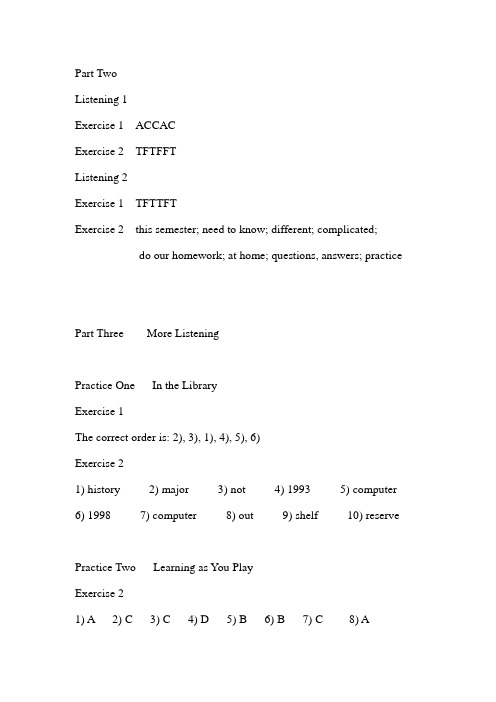
1) history 2) major 3) not 4) 1993 5) computer
6) 1998 7) computer 8) out 9) shelf 10) reserve
Practice Two Learning as You Play
Exercise 2
1) A 2) C 3) C 4) D5) B 6) B7) C8) A
do our homework; at home; questions, answers; practice
Part Three More Listening
Practice One In the Library
Exercise 1
The correct order is: 2), 3), 1), 4), 5), 6)
2) He thinks that it is effective and it makes learning become a pleasure.
3) The method helps learners to remember words without making an effort.
Practice Three Study Abroad
批注本地保存成功开通会员云端永久保存去开通
Part Two
Listening 1
Exercise 1 ACCAC
Exercise 2 TFTFFT
Liise 2 this semester; need to know; different; complicated;
Exercise 1
1) D 2) A 3) C 4) B5) A 6) B
Exercise 2
Unit four 重点词汇讲解- 新目标大学英语《综合教程》 第一册
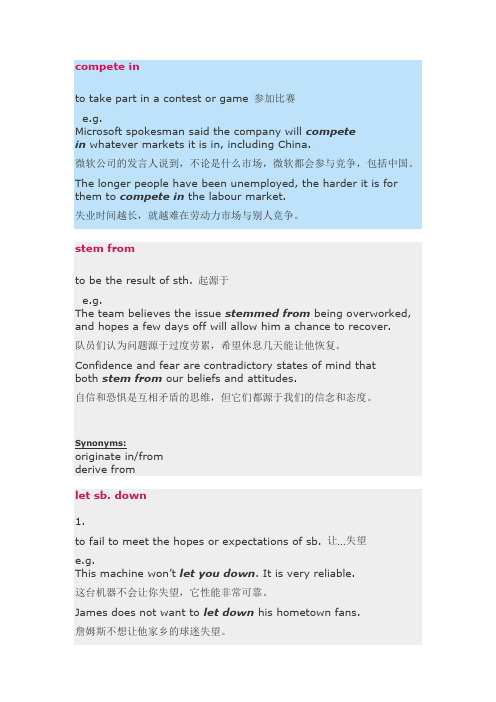
compete into take part in a contest or game 参加比赛e.g.Microsoft spokesman said the company will compete in whatever markets it is in, including China.微软公司的发言人说到,不论是什么市场,微软都会参与竞争,包括中国。
The longer people have been unemployed, the harder it is for them to compete in the labour market.失业时间越长,就越难在劳动力市场与别人竞争。
stem fromto be the result of sth. 起源于e.g.The team believes the issue stemmed from being overworked, and hopes a few days off will allow him a chance to recover.队员们认为问题源于过度劳累,希望休息几天能让他恢复。
Confidence and fear are contradictory states of mind thatboth stem from our beliefs and attitudes.自信和恐惧是互相矛盾的思维,但它们都源于我们的信念和态度。
Synonyms:originate in/fromderive fromlet sb. down1.to fail to meet the hopes or expectations of sb. 让…失望e.g.This machine won’t let you down. It is very reliable.这台机器不会让你失望,它性能非常可靠。
James does not want to let down his hometown fans.詹姆斯不想让他家乡的球迷失望。
医学英语新教程-习题参考答案Unit 4
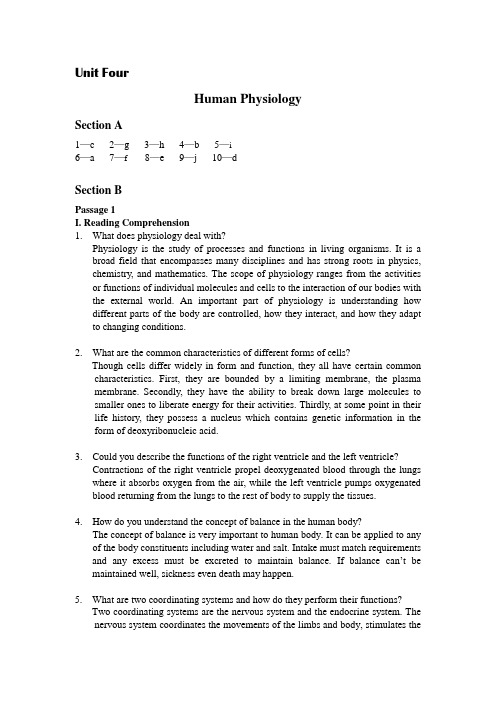
Unit FourHuman PhysiologySection A1—c 2—g 3—h 4—b 5—i6—a 7—f 8—e 9—j 10—dSection BPassage 1I. Reading Comprehension1.What does physiology deal with?Physiology is the study of processes and functions in living organisms. It is a broad field that encompasses many disciplines and has strong roots in physics, chemistry, and mathematics. The scope of physiology ranges from the activities or functions of individual molecules and cells to the interaction of our bodies with the external world. An important part of physiology is understanding how different parts of the body are controlled, how they interact, and how they adapt to changing conditions.2.What are the common characteristics of different forms of cells?Though cells differ widely in form and function, they all have certain common characteristics. First, they are bounded by a limiting membrane, the plasma membrane. Secondly, they have the ability to break down large molecules to smaller ones to liberate energy for their activities. Thirdly, at some point in their life history, they possess a nucleus which contains genetic information in the form of deoxyribonucleic acid.3.Could you describe the functions of the right ventricle and the left ventricle?Contractions of the right ventricle propel deoxygenated blood through the lungs where it absorbs oxygen from the air, while the left ventricle pumps oxygenated blood returning from the lungs to the rest of body to supply the tissues.4.How do you understand the concept of balance in the human body?The concept of balance is very important to human body. It can be applied to any of the body constituents including water and salt. Intake must match requirements and any excess must be excreted to maintain balance. If balance can’t be maintained well, sickness even death may happen.5.What are two coordinating systems and how do they perform their functions?Two coordinating systems are the nervous system and the endocrine system. The nervous system coordinates the movements of the limbs and body, stimulates themuscles to contract, and senses muscle tension and limb position. The endocrine system helps adjust blood flow and the supply of various metabolic substrates to the working muscles. The endocrine system produces hormones which travel in the bloodstream to the cells upon which they exert a regulatory effect.6—A 7—A 8—D 9—B 10—DII. Vocabulary StudyPart A1—platelets 2—physiological 3—Extracellular 4—nitrogen 5—Indigestible 6—urinary 7—lymphatic 8—glycogen 9—deoxygenated 10—oxidationPart B1—excrete 2—Evolution 3—stabilize 4—locomotion5—notion 6—dysfunction 7—intricate 8—endowed9—liberate 10—exquisitelyIII. TranslationPart A1.The success of physiology in explaining how organisms perform their daily tasksis based on the notion that they are intricate and exquisite machines whose operation is governed by the laws of physics and chemistry.生理学成功地解释了生物体如何进行日常活动,基于的观点是生物体好比是结构复杂而灵巧的机器,其运行机制受物理和化学规律的调控。
新编大学英语第三版综合教程第四册课后答案

Unit 1 PersonalityV ocabulary1. 1) self-conscious 2) self-confidence 3) self-esteem 4) self-destructive 5) self-worth6) self-concept 7) Self-awareness 8) self-assurance/self-confidence2. 1)B 2)I 3)L 4)A 5)H 6)D 7)E 8)N 9)J 10)M 11)C 12)F 13)G 14)K3. 1) profound 2) jealousy 3) numerous 4) overweight 5) overcome 6) eventually7) slim 8) compliments 9) diminish 10) reassurance 11) detrimental12) isolated 13) self-esteem 14) accented4. 1) reflected 2) concerned/worried 3) profound effect/influence 4) viewed/regarded5)sensitive 6) respond/react 7)eliminated 8)overcome my fear9) concentrate on 10) made no commentTranslation1) You should spend a reasonable amount of time relaxing and exercising.2) In general children are healthier and better educated than ever before.3) When the right opportunity comes along, he’ll take it.4) Every day he sets aside some time to be with his family and enjoy life.5) I remember those dark streets and walking hand in hand with my father.6) He finally failed to live up to his parents’expectations.7) In contrast, our use of oil has increased enormously.8) He succeeded in his efforts to overcome his fatal weakness.Part Four Writing and Translation2. Translation Practice1) It is believed that pessimism often leads to hopelessness, sickness and failure.2) Optimism, by contrast, can make you happy, healthy and successful.3) When you fail in something, profit from the failure as a learning experience.4) Think about your strengths and build up self-confidence in front of problems or difficulties.5) Don’t let negative thoughts hold you back.6) Everyone has experienced failures and disappointments, so don’t blame yourself too much.Unit 2 Myths and LegendsV ocabulary1. 1) A. invitation B. invited C. inviting 2) A. prepare B. prepared C. preparation D. preparatory/preparation3) A. discoveries B. discoverers C. discovered4) A. approval B. approve C. approved D. approving E. disapprove5) A. eloquent B. eloquence C. eloquently6) A. faithful B. unfaithful/faithless C. faith d. faithfully7) A. occasional B. occasionally C. occasion8) A. delivery B. delivering C. delivered9) A. troublesome B. troubled C. troubled D. troubling 10) A. assurance B. assured C. assure2. 1) got/ran into trouble 2) no trouble 3) asking for trouble 4) have …trouble 5) troublewith6) in serious/deep/big trouble 7) get/getting …into trouble 8) took the trouble3. 1) with a pattern of roses 2) prepared a wonderful/goof meal for us3) promised faithfully 4) deliver this letter5) a selection of milk and plain chocolate 6) keep out of mischief/behave themselves7) the sound of distant thunder 8) received approval from the government9) in spite of the fact that he drank too much 10) agree whether the drug is safe or notPart Three Further Development5. Complete the following Ancient Chinese story by translating the Chinese into English1) the true reason why there was no such animal in Guizhou2) they were of no use at all in this place3) when he saw the donkey all of a sudden, he thought it was a monster4) he hid himself in the trees while looking at the donkey5) what kind of animal is this and why does it look different from other animals that I’ve seen?6) But one day the donkey stretched its thin neck and cried7) the tiger discovered that the donkey didn’t have any other skills besides crying8) But he dared not rush to it and eat it just as he did to other animals9) This did irritate the donkey (made the donkey angry), who raised its hind leg and kicked the tiger10) This time he rushed to it without hesitation and bit its rhroatPart Four Writing and Translation2. Translation Practice万物之初天地还是一体充满混沌。
《新编实用英语》(第四版)听力教程教参3 4-4
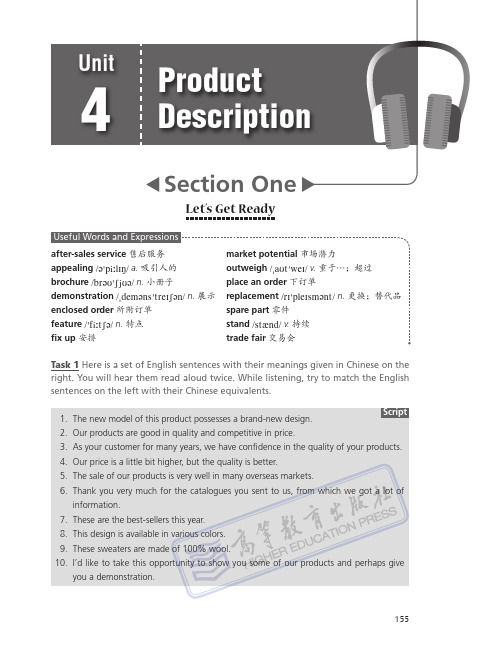
Key 1. C
2. A
3. D
4. B
5. A
157
4
6. D
7. B
8. B
9. D
10. A
Task 4 In this task, you will hear one long conversation. After the conversation,
there are some recorded questions. Both the conversation and the questions will
Script 1. I’m glad to have the chance to visit your factory. 2. Do you make table cloths? 3. Now let me show you how it works. 4. Does this new product operate by pressing a button? 5. How does this kind of electronic toy work? 6. Your catalogue describes that you have more than 20 series with over 100 designs, is
United States a number of your products.
Mr. Young: Mr. Clive, we very much appreciate your interest in our products.
Mr. Clive: We are interested in your wine and some other products.
3. A: This color is attractive. Does it fade? B: The color will s ta n d , for the cloth has fast colors. 4. A: All your products are fantastic. May I have a catalogue of your products? B: Certainly. Here is our catalogue and p r ice list. 5. A: Do you e xp or t leather shoes? B: Yes, it’s one of our main exports.
新编英语教程5(词汇Unit1-10)
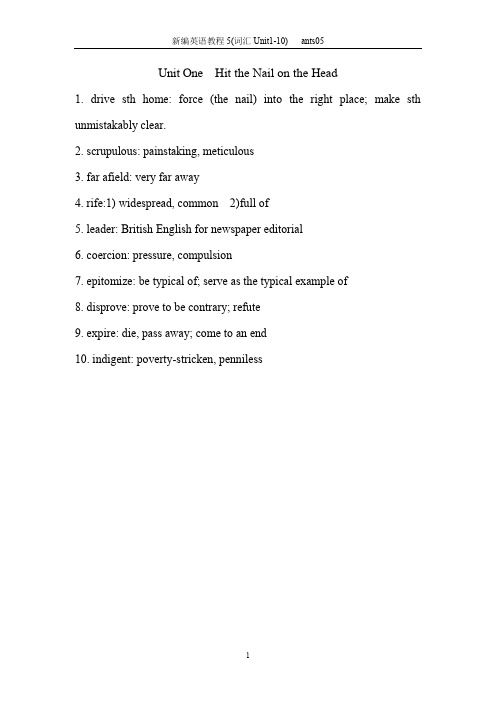
Unit One Hit the Nail on the Head1. drive sth home: force (the nail) into the right place; make sth unmistakably clear.2. scrupulous: painstaking, meticulous3. far afield: very far away4. rife:1) widespread, common 2)full of5. leader: British English for newspaper editorial6. coercion: pressure, compulsion7. epitomize: be typical of; serve as the typical example of8. disprove: prove to be contrary; refute9. expire: die, pass away; come to an end10. indigent: poverty-stricken, pennilessUnit Two Beware the dirty seas1. sluice: (v.) to pour as if from a sluice(水闸),i.e., a man-made passage for water fitted with a gate for stopping and regulating the flow; (n.) a channel controlling water flow2. nurture: further the development of; care for3. evolve: develop gradually (by a long continuous process)4. endemic: (of a disease) found regularly in a particular place5. litany: repetition. The literal meaning of “litany” is “a prayer consisting of a series of invocations and supplications by the leader with responses by the congregation”.6. flush: pour; flood with water to clean out (See dictionary)7. lurk: exist unseen8. effluent: liquid wastes, such as chemicals or sewage that flows out from a factory or some other places into a river or the sea9. plankton: very small forms of plant and animal life that live in a body off water 浮游生物10. slime: unpleasant sticky substance, such as the thick sticky liquid on the skin of various fishUnit Three My Friend, Albert Einstein1. knack: a clever way of doing things2. be in awe of: have respect as well as fear and reverence for3. staggering: unexpectedly surprising; astounding4. vestiges: traces5. ultimately: finally; after a long series of time6. recalcitrant: hard to deal with; unmanageable7. worry: assail a problem again and again until it is solved, just like a dog biting some small animals repeatedly, shaking it or pulling it with the teeth8. surcease: (archaic) cessation, pause9. plausible: seeming to be reasonable10. a house of cards: an insecure scheme11. ineffable: unutterable; incapable of being expressed in words12. elusively whimsical: indescribably quaint or strange 捉摸不透的,古怪Unit Four The Invisible Poor1. perennial: lasting forever or for a long time2. rutted roads: roads with deep, narrow marks made by the wheels of vehicles3. be exempt from: be freed from a duty. service, payment, etc.4. tenement: a large building, especially one in the poor part of a city, which is divided into small flats which are rented cheaply5. affluent: wealthy, prosperous6. compound v.: /kom'paund/ make worse by adding (something) to . . . (often used in the passive)7. existential: relating to human experience (a formal-word)8. lurid: sensational, shocking9. dispossessed: people who have lost all their possessions10. cynical: doubtful as to whether something will happen or whether it is worthwhile11. involvement: connection12. old rhetoric of reform: writings about reform in the past that sounded fine and important, but were really insincere and meaninglessUnit Five The Plug—in Drug:TV and the American Family,PartⅠ1. afflict: trouble2. asset: valuable object; advantage3. preposterous: unthinkable, absurd4. splintering: splitting, breaking up5. the peer group: a group of people of the same age, class, position. etc. here, group of children of the same age6. television-oriented: interested in and influenced by TV7. equivocal: ambiguous8. sorcerer: person who performs magic by using the power of evil spirits9. stint: fixed amount of work: here, the fixed TV programme10. conjure up: bring into the mind11. sane: (in this context) in possession of good relations/of a close bond12. backlog: a reserveUnit Six Preparing for College1. driving motive: the incentive / encouragement that urges them on;2. the rudiments: the basics, the fundamentals (The word rudiments is always in the plural form when used in this sense.)3. metaphysics: the branch of philosophy that deals with abstract concepts, etc. 形而上学,玄学,纯粹哲学4. conscious culture: the culture (i.e. customs, arts, etc,) that is directly perceptible or known to us5. fanatic: one who is very enthusiastic about a particular activity6. personify: express or represent ( a quality in human form)7. sedentary: inactive; done while sitting down8. underline: indicate the importance of9. balked: baffled; frustrated10. a maddening lot: a wild, uncontrollable group11. righteous sects: morally justifiable groups of people whose religious beliefs are considered different form those of a larger group12. relish: 味,味道,兴趣;开胃小菜;great enjoymentUnit Seven Grouping the Gifted:Pro1. innate: belonging to an individual from birth2. pursuit: an activity that one engages in as a profession, vocation, or avocation3. athlete: person who practises athletics; competitor or skilled performer in physical exercises4. heterogeneously: in such a way that members are very different from one another5. criterion /--ia: standard on which a decision may be based6. snob: one who has an offensive air of superiority (here, in matters of knowledge)7. elite: a socially superior group8. instill: put (ideas, etc. ) gradually but firmly into someone's mind by continuous effort9. spark: encourage; stimulate into greater activity10. latent: present and capable of becoming though not now visible or active11. skyrocket: rise or increase rapidly12. pay dividends: produce an advantage. especially as a result of an earlier action (dividend: that part of the money made by a business which is divided among those who own shares in the business 红利)Unit Eight Why Nothing Works1. savant: a man of learning, especially a person with detailed knowledge in some specialized field2. corollary: an immediate inference from a proved proposition3. forestall: defeat, prevent by prior measures4. commitment: a pledge to follow certain beliefs or a certain course of action; devotion (to duty etc. )5. artifact: a usually small object (as a tool or an ornament) showing human workmanship that has special historical interest6. evoke: bring to mind7. projectile point: the tip of a weapon that is thrust forward; spear or arrowhead8. band: a group of people formed for some common purpose and often with a leader9. barter: trade by exchanging one commodity for another10. alienation: a withdrawing or separation of a person from an object or position of former attachment; a feeling of not belonging to or being part of one's surroundingsUnit Nine Where Is the News Leading Us?1. symposium: a conference in which experts or scholars discuss a certain subject2. scrutinize: examine very closely and carefully3. distortion: misrepresentation; a false or dishonest account4. eruptive: (in this context) sensational, shocking, disturbing5. collide with: crash violently into; run into (one another)6. ingredient: a component part of something7. inhibitor: one who holds back, prevents8. deplete: exhaust, use up, reduce9. cynicism: disbelief in the sincerity of human motives10. antidote: remedy, corrective; something that prevents or counteracts11. envision: picture mentally, imagine, visualize12. caricature: a picture ludicrously滑稽的exaggerating the peculiarities or defects of persons or thingsUnit Ten Things:The Throw—Away Society1. Humanoid: having human form or characteristics2. texture: the degree of roughness or smoothness, coarseness or fineness, of a substance or material, especially as felt by touch; visual and tactile qualities of a surface3. staggering: stunning, wondrous, breathtaking4. deride: laugh at contemptuously; to scoff at or mock5. transience: temporariness, impermanence; the quality or state of being temporary or impermanent6. at a rapid clip: (informal) at a fast pace7. inextricably embedded: so deeply involved that it is impossible to get free8. boutique: a small fashionable clothes shop9. sumptuous: expensive and grand10. train: a part of a long dress that spreads over the ground behind the wearer11. A-line dresses: dresses with a flared bottom and close-fitting top, having an "A" or tent-like shape12. supplant: take the place of; replace。
新编英语教程6练习册句子翻译
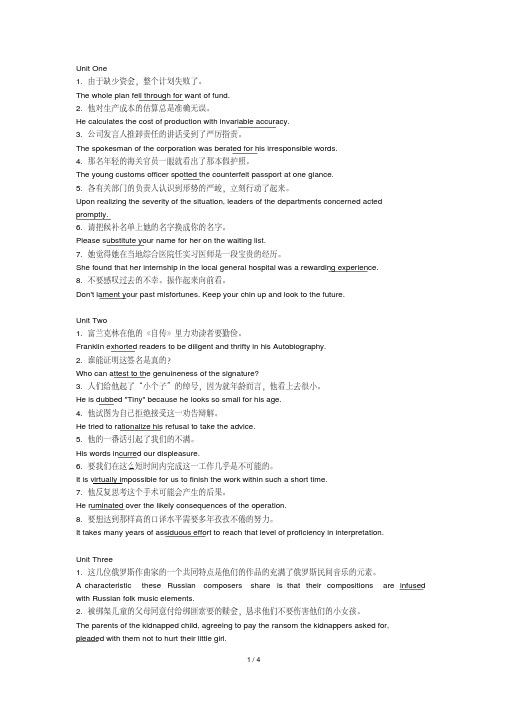
Unit One1. 由于缺少资金,整个计划失败了。
The whole plan fell through for want of fund.2. 他对生产成本的估算总是准确无误。
He calculates the cost of production with invariable accuracy.3. 公司发言人推卸责任的讲话受到了严厉指责。
The spokesman of the corporation was berated for his irresponsible words.4. 那名年轻的海关官员一眼就看出了那本假护照。
The young customs officer spotted the counterfeit passport at one glance.5. 各有关部门的负责人认识到形势的严峻,立刻行动了起来。
Upon realizing the severity of the situation, leaders of the departments concerned acted promptly.6. 请把候补名单上她的名字换成你的名字。
Please substitute your name for her on the waiting list.7. 她觉得她在当地综合医院任实习医师是一段宝贵的经历。
She found that her internship in the local general hospital was a rewarding experience.8. 不要感叹过去的不幸。
振作起来向前看。
Don't lament your past misfortunes. Keep your chin up and look to the future.Unit Two1. 富兰克林在他的《自传》里力劝读者要勤俭。
Franklin exhorted readers to be diligent and thrifty in his Autobiography.2. 谁能证明这签名是真的?Who can attest to the genuineness of the signature?3. 人们给他起了“小个子”的绰号,因为就年龄而言,他看上去很小。
新编实用英语基础教程Unit 4 What Do You Do Every Day

Unit | Four
Section Ⅰ Talking Face to Face 面谈
Imitating Mini-Talks
Speak and Recite
Acting Out the Tasks
Imitate and Perform
Putting Language to Use Speak and Complete
Unit | Four
What Do You Do Every Day?
Unit | Four
What You Should Learn to Do 学会做什么
1. Talk about daily activities 谈论日常活动
2. Tell time and date 告知时间和日期
What You Should Know About 学会了解什么
1. How people arrange their time 人们如何安排时间
2. Present tense 一般现在时
Unit | Four
Talking Face to Face 面谈
Section Ⅰ
Contents
Section Ⅱ
Being All Ears 洗耳恭听
Section Ⅲ
Unit | Four
Putting Language to Use 使用语言
Speak and Complete 学说填空 3. Complete the following dialogue according to the hints given in Chinese.
根据中文提示填入恰当语句补全下列对话。
Read and Judge 阅读判断
新编大学基础英语综合教程四Units 1-5课后翻译答案

新编大学基础英语综合教程4课后翻译答案UNIT 1Page104. 1.I have offered her a wide range of choices.我给了她很大的选择范围2.We can’t identify fortune with happiness.幸福和财富不能混为一谈3.People constantly search for better career prospect.人们总是不断地寻找更好的职业前景4.Teaching is not a highly rewarding job.教书酬劳不太高5.Busy work can take one’s mind off family issues.繁忙的工作总会使人不去想家庭问题Page113. 1.I want to apply for a visa.我想申请签证2.It is difficult to speak in public.当众演讲是很难的3.The old man wishes to go back to his hometown.这位老人的愿望是回到故乡4.She covers her face with her hands to conceal her excitement.或She buries her face in her hands to conceal her excitement.她用手捂着脸来掩饰她的激动情绪5.It would be good to see him again.能再见到他该多好啊Page125. 1.The police appealed to the crowd not to panic.警方向人群呼吁不要惊慌2.We should assume that he is innocent until he is proven guilty. 要是还没有证实他有罪,我们就得认为他无罪3.His wife’s death made him feel vulnerable and depressed.妻子的去世使他感到十分脆弱和消沉4.She has been transferred to our paris branch.她已调到我们巴黎的分部5.As for as the weather concerned I don’t think it is veryimportant.至于天气,我认为无关紧要Page143. 1.I was seeing a friend off at that moment.我当时正在给一位朋友送行2.He told me that Jane had already left.他告诉我简已经走了3.How do you find the weather here?你觉得这里的天气如何4.Did you go there by train or by plane?你是乘火车还是乘飞机去的5.She is very excited ,she has never travel by plane before.她很兴奋,她以前从未坐过飞机Page166. 1.He has a serious aspiration for a career in politics他有从政的雄心壮志2.He doesn’t play half as well as his sister.他演奏的水平不及他姐姐的一半3.He has never done this kind of job.I don’t know wether he is able to fit in with other employees他以前从未做过这种工作,我不知道他是否能与其他雇员配合好。
全新版大学英语综合教程第三册 Unit 4PPT课件

Space Exploration
ce Exploration
In 1981 the USA launched a space shuttle, the first reusable space craft.
The first reusable space shuttle
Space Exploration
On Oct. 15, 2003, Shenzhou V sent China's first astronaut Yang Liwei into space, making China the third nation following the former Soviet Union and the United States to place a human in orbit. China hopes to launch the Shenzhou VI next year in a flight that will place two astronauts in orbit for between five and seven days.
Cultural Notes
Other factors of relevance in the search for extraterrestrial life include an assessment of the probability that intelligence leading to scientific and technological civilizations similar to our own may arise.
The Planets
新编实用英语综合教程二unit4hotelservice.1 推荐

4) I’m Awfully sorry. Tom: I’d like to book a single room for two nights.
What You Should Know About
1. Hotel services in the USA 2. Relative clauses
Talking Face to Face
Section Ⅰ
Section Ⅱ
Being All Ears
Section Ⅲ
Contents
Section Ⅴ
Appreciating Culture Tips
Section Ⅳ
Maintaining a Sharp Eye
Trying Your Hand
Section Ⅰ Talking Face to Face
Imitating Mini-talks
Speak and Recite
Acting out the Tasks
Back
Unit | Four
3) Would you please show me your passport? Catherine: I would like to stay in this hotel for a couple of days.
Receptionist: Welcome. Would you please show me your passport? Catherine: Here you are.
Receptionist: I’m awfully sorry. We don’t have any room available now. Tom: No problem. I’ll try some other hotels nearby.
新编大学英语(第四版)综合教程2课件B2U4 Reading 1
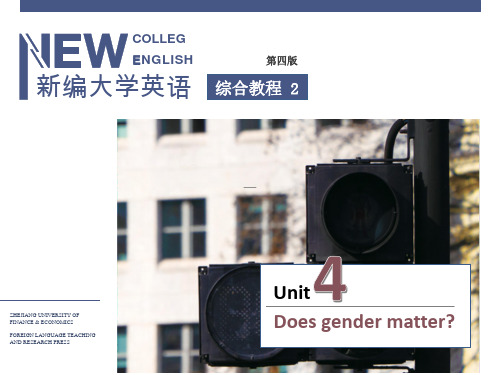
新编大学英语(第四版Байду номын сангаас 综合教程 Unit 4
Reading 1
Text exploration
Pre-reading questions Pre-reading questions Structure Text reading Vocabulary
新编大学英语(第四版) 综合教程 Unit 4
Reading 1 TTeexxtteexxpplloorraattiioonn
Watch for information Watch a video clip and complete the table with no more than FOUR words for each answer.
What are the differences between men and women in ways of thinking and how are these differences related to brain characteristics?
新编大学英语(第四版) 综合教程 Unit 4
Reading 1
目录 contents
全新版大学英语综合教程4unit4课文翻译
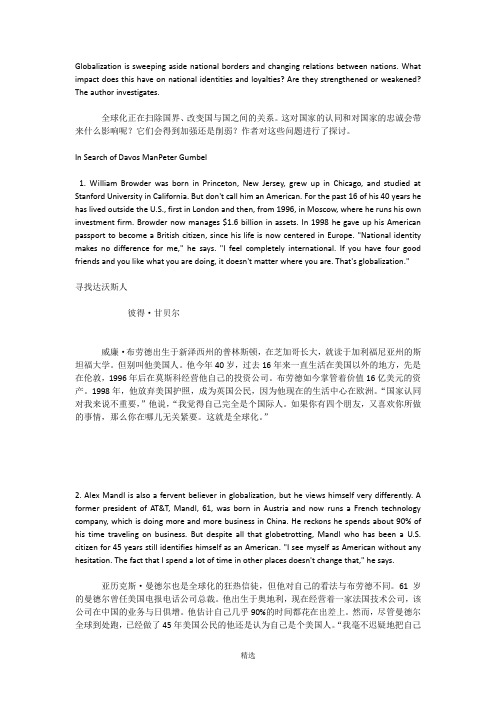
Globalization is sweeping aside national borders and changing relations between nations. What impact does this have on national identities and loyalties? Are they strengthened or weakened? The author investigates.全球化正在扫除国界、改变国与国之间的关系。
这对国家的认同和对国家的忠诚会带来什么影响呢?它们会得到加强还是削弱?作者对这些问题进行了探讨。
In Search of Davos ManPeter Gumbel1. William Browder was born in Princeton, New Jersey, grew up in Chicago, and studied at Stanford University in California. But don't call him an American. For the past 16 of his 40 years he has lived outside the U.S., first in London and then, from 1996, in Moscow, where he runs his own investment firm. Browder now manages $1.6 billion in assets. In 1998 he gave up his American passport to become a British citizen, since his life is now centered in Europe. "National identity makes no difference for me," he says. "I feel completely international. If you have four good friends and you like what you are doing, it doesn't matter where you are. That's globalization."寻找达沃斯人彼得·甘贝尔威廉·布劳德出生于新泽西州的普林斯顿,在芝加哥长大,就读于加利福尼亚州的斯坦福大学。
- 1、下载文档前请自行甄别文档内容的完整性,平台不提供额外的编辑、内容补充、找答案等附加服务。
- 2、"仅部分预览"的文档,不可在线预览部分如存在完整性等问题,可反馈申请退款(可完整预览的文档不适用该条件!)。
- 3、如文档侵犯您的权益,请联系客服反馈,我们会尽快为您处理(人工客服工作时间:9:00-18:30)。
Unit 4T ext II.Writing Skills1)The text is a piece of narrative writing and organized in the usual chronological order. But atthe start of the text, the author used the flashback technique by beginning with the signing of the will and then turned back to t he classification of Shakespeare’s life into several periods based on a time order. The author also used the “cyclic return” in the writing by using the key word “signature” both in the first paragraph and the last paragraph. The two techniques helped the author to inform the reader about the life of Shakespeare most effectively.2) The author used many adjectives ending with “–ing”, superlatives and some emphaticsentence patterns to achieve an “emotional” tone, trying to arouse the strong feelings in readers.II. Language Points1.The way to express datee.g. in May; in 1999; in June, 1998; on August 3rd, 19982.number-year/month-old + n.e.g. He has a two-month-old baby.He offered his seat to a sixty-five-year-old woman.cf: They had a ten-minute talk.No decision was made after a two-hour meeting.3.will, legacy, inheritance, estatewill: a legal statement about how to deal with the property after deathlegacy: money or other belongings left to another person after deathinheritance: receiving property, title from ancestors according to the willestate: Estate includes real estate and personal estate.real estate (动产): land and buildingpersonal estate(不动产): money, property4.the second/third/by far + the superlative degree of an adjectivee.g. Hainan Island is the second largest island in China.Paraphrase:She is one of the most diligent girls in our class and considered to be No. 3.The Amazon is the longest river in the world. (use “by far”)This book is the most interesting one of all the books. (use “by far”)5.adv + off = richcomfortably off, well off, well to dobe better off = be in better circumstancesbe worse off = be in worse circumstances6. amount to①add up to, reache.g. Our monthly expenditure on food usually ~s to 150 yuan.②be equal in meaning, be the same ase.g. Failure to prepare a lesson well before class on the part of the teacher ~s tonegligence of duty; whereas failure to attend the class on time on the part of thestudent ~s to a breach of discipline.7. there is no … not …double negation for emphasise.g. No one who was treated by Dr Wang was not deeply moved by his conscientious work. Use “ No one … not” to paraphrase the following:Everyone who has been to Beijing is impressed by the magnificence and grandeur of the Great Wall.Everyone who saw the house designed by him was interested in its structure.Everyone who heard the report was touched by his deeds.8. awe①awe (n.): a mixed feeling of fear and feare.g. He has a feeling of ~when standing in front of his father.I read his novel with ~.The lazy boy stood in ~of his stern teacher.awe-inspiring: fill with awe, make people show more respect to sb.e.g. He is an awe-inspiring writer/manager.awe-stricken/struck: struck with awee.g. He was awe-struck when he saw his father.②awe (v.): fill with awee.g. The sight ~d them.I was ~d by his words.~ sb. into + n. /doing sth.e.g. He ~d the children into obedience.They were ~d into silence.The boss ~d the workers into working overtime.③adj.A. awesome: causing awee.g. His works are ~ to some readers.B. awful: dreadful, very bada) (showing one’s feeling)e.g. He died an ~ death.I feel ~.b) (describing the characteristics of an object)e.g. Everything is in an ~ mess.The pain is ~.④awfully (adv.): verye.g. Y ou look ~ well today.He is ~ worried about his son.9. in spite of, althoughin spite of + n.; although + sentencee.g. Although he is old, he is still studying English.In spite of his old age, he is still studying English.Use “although” and “in spite of” to paraphrase the followingIt’s very cold outside, but the boys are playing happil y.It’s very expensive, but I buy one as a souvenir.The mountain is really very tall, but we managed to reach the top.10. rather than(n/v-ing): instead ofe.g. Y oung people should be an asset (财产)to society ~a menace or a curse.Rather than squeezing your own oranges, have you tried buying packs of orange juice?Paraphrase:It was such a low doorway that I had to bend my head to go into the room instead of walking into the room upright.He died instead of surrendering.11. have difficulty in +V-ing/with + n.e.g. He has difficulty in learning English.I don’t have any difficulty with my math.12. plot①v. --- make secret plans 设计(谋),密谋~ to do sth.e.g. The two thieves were plotting with another two to rob the bank.Paraphrase: They are making secret plans to climb over the wall to poison the dog.~ + n.e.g. They are plotting a coup d’etats (or: coups d’etat政变) in the garden.~ againstParaphrase: The guerrillas were trying to overthrow the government.②n.a) make/form a plot (= a secret plan)e.g. They are making a ~ to overthrow their government.Two men formed a ~ to burn the barn (to rob the bank)b) design the plot of a story (=outline)e.g. This play has a very complicated ~.c) a piece of lande.g. There is a vegetable ~ behind his house.13. involve①involve (v.): cause sb. to become connected or concerned 牵涉,拖累e.g. This case ~s all of us.Don’t ~ me in your quarrel.be/get/become ~d in 卷进e.g. I got ~d in the quarrel between Mary and Jones.David was ~d in the robbery.~ (oneself) with 与… 混在一起e.g. Don’t ~ yourself with that sort of people.He ~s himself with criminals.②involved (adj.): complicated, difficult to understande.g. He told me an ~ story about his large family.The letter was very ~.③involvement (n.)e.g. He can’t get rid of the ~ in the murder. 脱不了干系,洗脱不了嫌疑14. puzzle①puzzle (v.): causing difficulty to understande.g. His illness ~d the doctor.T he boy’s recent behavior ~d me.~ about: make a great effort of mind in order to find an answer to the questione.g. I’ve been puzzling about the question.Paraphrase: He was trying to find out the ways to settle the problem.~ out (绞尽脑汁地)想出e.g. He spent the whole afternoon, trying to ~out the answer.be ~d aboute.g. I’m ~d about what he said.Many people are ~d about his life.②n.A. puzzlement: the state of being puzzlede.g. He is in ~.The girl looked at me in ~.B. puzzlea)sth. that one can’t understand or explain 难解之事e.g. No one has succeeded in explaining the ~of how life began.Paraphrase:The detectives still can’t explain the murder case.b) be in a puzzle: be at a losse.g. I’m in a ~as to what to do next.c) 字谜e.g. A famous Chinese ~has seven pieces. 七巧板a cross-word ~填字游戏a jigsaw ~拼图游戏15. conviction: very firm and sincere beliefe.g. He speaks in the full ~ that he is right. (深信)It is my ~ that we can have the four modernizations realized in not so long a time.Paraphrase: He said with a firm belief that he saw it with his own eyes.16. talk … into …: persuade sb. to do sth.17. trace①trace (v.)a) follow or discover sb. or sth. by observing some marks, traces or little evidencee.g. They could not ~(= find) him.Paraphrase:I can’t find the document you refer to .They walked along the river until they came to the sea. (trace… down….)We tried to find out the origin of this story. 追踪寻源(trace … to …)b) try to finde.g. The post office is ~ing the missing parcel.c) mark 标出e.g. Please ~the location of London on the map.d) 描图e.g. Trace the map by putting the thin paper over it.trace back toe.g. His family can ~its history back to the 10th century.This system of the government can be ~d back to the ancient Romans.The rumor was ~d back to a journalist.②trace (n.)a) marks, signse.g. We’ve lost all ~s of the criminal.Paraphrase:The wolf left its marks on the snow.He has disappeared without any signs..The policemen found signs of struggle in the room. 有搏斗的痕迹b) a bite.g. There was a ~of jealousy in her voice.Paraphrase: It rained a bit (= a little) yesterday.③traceable (adj.)e.g. The mistake is ~to carelessness.18. the lost years: seven years from 1585 to 1592, the time when Shakespeare was supposed to betraveling abroad by sea19. influence①influence (v.): have an effect on sth./sb.e.g. Advertisements ~people’s life a lot.The weather ~s the growth of crops.cf: affect: focus on the resultinfluence: focus on the action itselfe.g. Too much drink may affect your health. (The result of too much drink might spoilyour health.)We’re deeply affected (=moved) by his speech.②influence (n.)have ~ over/on sth./sb.have a(n) + adj. + influence on/over sth./sb.e.g. A teacher can have a great ~over his students.Religion has a great ~on people’s behavior.exert an ~ one.g. The moon exerts an ~on the tides. 潮汐The climate exerts an ~on vegetables.③influential (adj.)e.g. He was an ~writer in China.His father is an ~man in our city.III. Questions on T ext I (Book 3, Unit 4)1. What is Shakespeare’s will about and when did he sign his will?2. What do you think of Sh akespeare’s financial condition? Why?3. According to the author, what is the most important thing to historians?4. How did people in the world like Shakespeare’s novels? Why?5. Why did the author say that Shakespeare lived only yesterday?6. What has S hakespeare’s fame brought to his birthplace?7. Is there any difference between English in Shakespeare’s time and present-day English?8. Why did the author say that writing about his life is just like writing detective stories?9. There is no record about his whereabouts from 1589 to 1592, where was he in those seven years probably?10. Was he suffering from toothache at sea?11. When did he begin to be interested in drama and how?12. What can be considered as the evidence indicating the beginning of Shak espeare’s literarycareer?13. As a dramatist, what else did Shakespeare do in addition to working on play?14. Why are there so many mysteries about Shakespeare? Is it possible to solve them?15. Can you tell me anything else you know about Shakespeare?IV. T ranslation1.老王为什么要辞职使他的好多同事感到迷惑。
